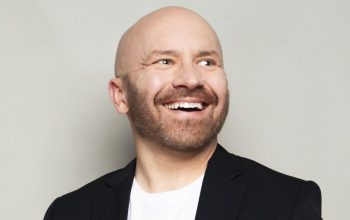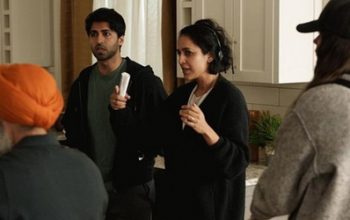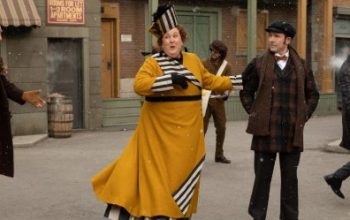Canadian docuseries Reelside concludes tonight on The Movie Network with their “Superheroes” episode.
If you haven’t heard about Reelside yet, it’s a fascinating look at the film and TV industry that really explores what goes into bringing their art to life. Each episode features a different filmmaker as they embark on a creative journey, built around a theme.
I quite enjoyed Episode 4, “Science Fiction”, which featured director/screenwriter Vincenzo Natali (Cube, Splice), writer/producer Graeme Manson (Orphan Black, Cube), and actor Michael Hogan (Battlestar Galactica, Teen Wolf). I chatted with Graeme Manson about that episode, and he had some great insight into the creative process, as well as some thoughts on how it has changed since the advent of social media. Read our conversation below, and check out Reelside!
Most people know you from your work on Orphan Black, but Reelside gets into another sci-fi film you were a part of in the 90s, Cube. How did you get involved with that project and what was your role?
I was at the Canadian Film Center with Vincenzo Natali. We were in the same class — he as a director, myself as a writer — when he got the feature film project opportunity to make a low budget film. He already had a script, him and Andre Bijelic. It was Vincenzo’s pet project. They wanted a rewrite in order to access the funding to make the film. Vince came to me because we had made a little short film at school together about two people who get in a car accident and bond over a vacuum cleaner before they die. We had the same sensibility. We were friends, and we really liked working together. Vince thought to get me on to rewrite it, which was really great. It was an opportunity to take a kick at a feature film that was actually going to camera when I did my rewrite. Essentially what I brought to it was the existential. The script at the time had its mechanics, it was that Swiss watch of a plot, mathematics and everything. It was more of a futuristic prison break, and we decided to make it an existential dilemma and have these characters awaken from their daily lives in the real world and ground it that way.
Audiences are now more aware of the creative process than they were at the time of Cube. Has that audience awareness altered how you create that content now?
Yeah, in certain ways. I mean, it’s not just that. It’s the whole explosion of social media attached to your career as a filmmaker. Access to your fans and access to people going the other direction is such a different landscape than it used to be, with fans and fandom. It existed before, but it’s become it’s own thing with social media. It is much different. If we were releasing Cube now, it would be much different than when we released it in ’97. We had a very traditional launch and sale of the film at TIFF, then relied on buzz and word of mouth. Some key reviews and gaining underground status is how the film went. It would be way different these days. It would all be so much faster and quite possibly burn a lot brighter and go out.
I quite enjoy sci-fi that scares me in a way, whether it’s a medication that causes a zombie apocalypse or machines becoming aware. Certain aspects of Orphan Black frighten me because it operates in a very real arena. Is that an aspect of sci-fi that appeals to you?
Certainly a tone I love is not necessarily horror but thriller, and same with John Fawcett (Orphan Black director/producer). John is even more of a horror guy. We love that tone but at the same time, this goes back to Mary Shelley’s Frankenstein, and The Island of Dr. Moreau. It’s science gone wrong, and that’s a trope. It’s not accurate when depicting most scientists. There’s reason to be wary of science, but the reasons are far more profound. The characterizations of scientists is far more complex than that. The vast amount of scientists are doing things that are vastly beneficial. It is the unknown as we tinker with our own building blocks of life.
Going back to audiences being more involved in what they’re watching, is the life of a show or film outside of what is seen on screen something that is planned out in advance now and incorporated into the projects, or do they grow out of the projects as they’re being written and produced? For example, supplemental content online, or something that causes viewers to pick up a certain book or research a specific topic?
I think that’s organic, and the same question you always ask about what makes a story interesting. I hate the word “resonate”. What’s in the zeitgeist? Why is this rich in metaphor and how has it been treated in literary or film history? What does it mean historically, how has it been perhaps overlooked or ill-treated? What’s a new take on it? Whatever your angle of science is, whatever is your “sci” and your “fi”, you look for the storytelling capacity of it.



One thought on “The ‘Reelside’ of Science Fiction with Graeme Manson”